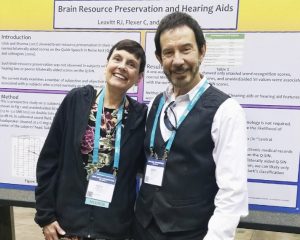Hearing Difficulty?
It’s Important to Know the Business You Are In
Dr. Ron Leavitt, Audiologist
A noted entrepreneur once said “It is important to know what business you are actually in.” In recent years this quote has taken on new meaning for hearing health care providers.
In the past some audiologists may have thought we were in the hearing aid sales business. Then cochlear implants came along and that view was broadened to include a more encompassing term such as the “hearing improvement business” since hearing aids were no longer the only tool in the toolbox.
Today hearing health care providers are faced with a mountain of data suggesting we are in the cognitive optimization business.
Specifically, it is now known that when hearing loss is untreated or improperly treated, a host of anatomical and physiological changes occur in the brain that result in a phenomenon known as “synaptic pruning and resource reallocation.”
While synaptic pruning is used by the healthy brain to minimize those pathways that are nonessential to existence, when hearing loss is improperly treated synaptic pruning and reorganization takes place in critical areas of the brain associated with higher order reasoning. Such unfavorable reorganization/pruning may be a gateway to dementia whose strong relationship to hearing loss has been well documented.
The obvious question then becomes what should we be doing to prevent such an outcome? First, when friends, family or colleagues start saying you are having hearing problems act immediately to get a comprehensive hearing test. There is likely a point of no return where the brain is too improperly pruned/reallocated to recover (see https://corvallishearing.com/1feb2021 for more in-depth discussion).
Next, every hearing aid and cochlear implant must be programmed so as to provide audibility of the greatest number of speech sounds possible within the limitations of the individual’s hearing loss. Unfortunately, such programming rarely occurs (see https://corvallishearing.com/2feb2021 or https://corvallishearing.com/3feb2021 or https://corvallishearing.com/4feb2021 for more in depth explanation).
Next, you must work to maintain optimized hearing of speech sounds. Such maintenance entails annual hearing and hearing aid/cochlear implant checkups. Hearing rarely gets better over time and some causes of hearing loss result in a fairly rapid degradation of hearing in a relatively short time frame. As such, hearing aid reprogramming may be necessary on an annual basis or sooner.
Additionally, hearing aid and cochlear implant performance may degrade over time, particularly when used in high humidity or dusty/polluted environments or worn with excessive amounts of hair spray.
Finally, we must all take some initiative to stay physically active and eat well as contemporary research has shown both are critical areas of intervention in cognitive optimization for both children and adults (see https://corvallishearing.com/5feb2021 and https://corvallishearing.com/6feb2021 and https://corvallishearing.com/7feb2021 and https://corvallishearing.com/8feb2021 for more info).
For anyone interested in more information on this topic we will be presenting this information at our next “virtual” Better Listening Seminar and on our website in the near future. For more info call (541) 754-1377.
